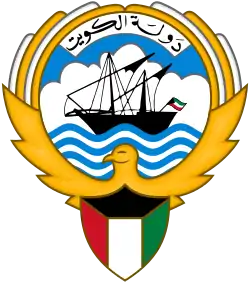Human rights in Kuwait
Kuwaiti law, including the Constitution of Kuwait, pledges to protect all human rights. The enforcement mechanisms designed to help protect human rights, are relatively new in Kuwait, with limited independent oversight from Kuwaiti courts or NGOs.
Treaties
Kuwait is a party to several international human rights treaties, including[1]
- International Covenant on Economic, Social and Cultural Rights
- International Covenant on Civil and Political Rights
- Convention on the Elimination of All Forms of Racial Discrimination
- Convention on the Elimination of All Forms of Discrimination against Women
- Supplementary Convention on the Abolition of Slavery, the Slave Trade, and Institutions and Practices Similar to Slavery
- Convention for the Suppression of the Traffic in Persons and of the Exploitation of the Prostitution of Others
- United Nations Convention Against Torture
- Convention on the Rights of the Child
- Convention concerning the Prohibition and Immediate Action for the Elimination of the Worst Forms of Child Labour
- Convention concerning Forced or Compulsory Labour
- Freedom of Association and Protection of the Right to Organize Convention
- Abolition of Forced Labour Convention
- Discrimination (Employment and Occupation) Convention
- Convention against Discrimination in Education
Invasion and Gulf war
In 1990, Iraqi president Saddam Hussein invaded next door Kuwait. The Iraqi military forces defeated Kuwaiti forces and they abused many Kuwaiti citizens and residents. Some were taken back to Iraq and released later.[2]
Migrant workers
Thousands of migrant workers are subjected to conditions of involuntary servitude by employers in Kuwait. The workers were subject to physical and sexual abuse, non-payment of wages, poor work conditions, threats, confinement to the home, and withholding of passports to restrict their freedom of movement.[3][4] Repeated abusers include M A Al-Kharafi & Sons and its subsidiary Kharafi National that have been cited by human rights organizations and the United States Department of State Country Report on Human Rights Practices for Kuwait.[5][6][7]
Bedoon
There are 100,000 Bedoon in Kuwait. The Bedoon are reportedly stateless people. Kuwait considers the Bedoon illegal immigrants, but many of these persons were originally from Kuwait and failed to register after independence[8]
Women's rights
Kuwaiti women are among the most emancipated women in the Middle East region. In 2014 and 2015, Kuwait was ranked first among Arab countries in the Global Gender Gap Report.[9][10][11] In 2013, 53% of Kuwaiti women participated in the labor force.[12] Kuwaiti women outnumber men in the workforce. At the end of a 9-day visit to Kuwait on 15 December 2016, the UN Working Group on the issue of discrimination against women in law and in practice praised Kuwait for its achievements in education and in the labour force, but warned against the persistent barriers, both in law and in practice, on the path of women's quest for full equality[13] UN human rights experts Alda Facio and Kamala Chandrakirana said despite significant achievements, “discrimination against women persists in law and in practice, particularly in the context of the family and nationality laws, based on the presumption of women’s dependence on men, which is contrary to the principle of equality.”[14]
Muslim women in Kuwait are discriminated under the family law. Children born to a Kuwaiti mother and non-Kuwaiti father do not get Kuwaiti citizenship, unless a decree is passed by the Minister of Interior.[15]
LGBT Rights
LGBT people living in Kuwait may face discriminatory laws and public attitudes.
Media freedom
Voice over Internet Protocol is legal in Kuwait.[16]
According to a 2009 report from the Reporters without Borders, Kuwait is engaged in pervasive Internet filtering and selective filtering in security areas. The primary target of Internet filtering is pornography. The Kuwait Ministry of Communication regulates ISPs, making them block pornography and anti-security websites.[17]
See also
References
- "Ratification of International Human Rights Treaties - Kuwait". University of Minnesota Human Rights Library. Retrieved 25 June 2012.
- Kelly, Michael (1991-03-24). "The Rape and Rescue of Kuwaiti City". The New Republic. ISSN 0028-6583. Retrieved 2020-11-30.
- "Trafficking in Persons Report 2007". U.S. Department of State. 2007. Retrieved 25 June 2012.
- "2007: Annual Survey of violations of trade union rights". International Trade Union Confederation. 2007. Archived from the original on 18 March 2012. Retrieved 25 June 2012.
- "Kuwait". United States Department of State. Retrieved 2020-10-20.
- "Kuwait: Construction workers at Kharafi National stranded without pay or valid visas - Business & Human Rights Resource Centre". www.business-humanrights.org. Retrieved 2020-10-20.
- "Despite ongoing contracts, many Kharafi employees work without pay | Migrant-Rights.org". www.migrant-rights.org. Retrieved 2020-10-20.
- "BBC Talk Show about Bedoon (29:07)" (in Arabic).
- "The Global Gender Gap Index 2014 - World Economic Forum". World Economic Forum.
- "Kuwait highest in closing gender gap: WEF". Archived from the original on 2016-10-11. Retrieved 2017-03-19.
- "Global Gender Gap Index Results in 2015". World Economic Forum.
- "Kuwait: Selected Issues" (PDF). p. 17.
Kuwait has higher female labor market participation than other GCC countries; further improvements in labor force participation can support future growth prospects. Kuwait’s labor force participation rate for Kuwaiti women (53 percent) is slightly above the world average (51 percent) and much higher than the MENA average (21 percent).
- "OHCHR | Kuwait: Tackling persistent barriers for women to sustain progress". www.ohchr.org. Retrieved 2019-06-19.
- "OHCHR | Kuwait: Tackling persistent barriers for women to sustain progress". www.ohchr.org. Retrieved 2019-06-19.
- ?, ? (10 March 2014). Human rights watch. Kuwait City: ?. p. 2.CS1 maint: numeric names: authors list (link)
- "Nokia Networks' Zain Make Kuwait's First High-definition Voice Call in Live LTE Network". Retrieved 2014-07-26.
- "Kuwait: State of the media", Menassat
